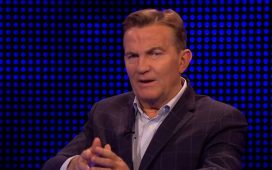A senior NHS boss and former service high-flyer are among the leading contenders to succeed Simon Stevens in NHS England’s top job, with an announcement imminent.
Ministers and NHS England’s board have been assessing candidates for several weeks and are preparing to name the person who will become the service’s new chief in the next few days.
They are choosing from a shortlist that includes Amanda Pritchard, Stevens’s deputy, and Mark Britnell, who had a stellar rise in the NHS before leaving to join business services firm KPMG.
NHS England’s independence from government means the winner will be chosen jointly by its board and the Department of Health and Social Care, with significant input from No 10.
Boris Johnson, the health and social care secretary, Sajid Javid, cabinet secretary Simon Case and the chair of NHS England’s board, Lord David Prior – a former Conservative MP and health minister – have all been closely involved in the appointment process. Whoever takes over will be the head of an organisation with a £150bn annual budget that employs 1.2m staff.
Sources say Javid has taken a leading role in identifying Stevens’s successor, despite only succeeding Matt Hancock on 26 June. He is understood to have been behind the axing from the longlist several weeks ago of Dido Harding, the Conservative peer who has run the government’s heavily criticised £37bn test-and-trace programme.
She raised eyebrows in the NHS by briefing a Sunday newspaper about her application, including a plan to make the service’s workforce entirely homegrown, which bosses of health trusts privately dismissed as “nonsense” and “impossible”. Hancock was keen to see her land the job.
In recent weeks Pritchard has been seen as the favourite. She has been NHS England’s chief operating officer and also chief executive of NHS Improvement, its sister body, since 2019. She is widely liked and respected in the NHS for her stint as the boss of Guy’s and St Thomas’ hospital trust in London. Stevens is understood to have made clear privately his view that she is the best person to follow him, which may boost her chances.

If Pritchard does get the job, she will be the first female chief executive of the NHS since its creation in 1948. Stevens, who stands down this month, and his seven predecessors have all been men.
However, NHS sources believe that there has been a recent shift in opinion among those making the selection towards appointing 55-year-old Britnell. He became chief executive of University Hospital Birmingham NHS trust at just 34, which is unusually early to take on such a senior role. He then became the NHS’s director-general for commissioning and system management in 2007, when the organisation was still part of the Department of Health.
He has many admirers in the NHS, which he left in 2009 to join KPMG, initially as its head of health for the UK and Europe before becoming its global chairman for healthcare a year later. He is an expert on the growing global shortage of healthcare staff and published a book in 2019 setting out what governments could do to tackle it.
He became embroiled in a controversy in 2011, amid an outcry at the coalition government’s shake-up of the NHS, when the Observer disclosed that he had said that the service would be “shown no mercy” and turned into “state insurance provider, not a state deliverer” of care as a result of the planned reforms. He claimed that his remarks were taken out of context. He has praised the NHS for saving his life after he developed prostate cancer.
NHS leaders are keen to ensure that Stevens’s successor continues his habit of speaking out on policy matters, even if that discomforts ministers. The job specification for the chief executive’s post says that candidates should have “the ability to speak truth to power”.
However, the government’s new health and care bill seeks to give the health secretary much enhanced “powers of direction” over NHS England, thus curtaining its boss’s independence.
It has been thought that the government wanted Stevens’s successor to be less independently minded and less likely to cause trouble by making policy demands in public, especially on NHS funding, in speeches and appearances before Commons select committees.














